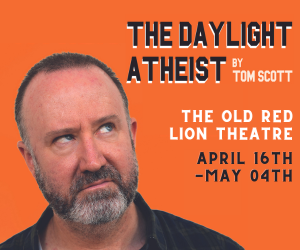Adele Hampton was a member of the Washington DC 2013 Beltway Poetry’s National Slam Team. She has performed at The John F Kennedy Centre for the Performing Arts and is a Capturing Fire Queer Spoken Word Summit Slam finalist. I sat down with Adele before the third heat of the BBC Edinburgh Fringe Slam, which she went on to win.
I was surprised the first the first time someone said that one of my poems had affected them.
How long have you been performing poetry for?
I started performing poetry in 2012, and writing when I was in college. I’m not one of those people who have been writing since five, I was just bored in class. I used to hate reading my own voice, and so I never kept a journal. My roommate showed me a poem by Andrea Gibson, and I thought “holy shit, people actually say their feelings.”
I didn’t really want to perform my poetry until I moved to Washington DC after college. Washington DC has a very large spoken-word scene. It was a really cool scene to come up in, because you could be really hard-core and try to win all the slams, or just perform at LGBT nights.
How did you find out about the BBC Slam?
My fiancé told me I should put my name in the hat and I said “nope”.
I was on the national slam team for Washington DC in 2013. I thought that was how people became a legitimate performance poet. This wasn’t until after nationals, but I began to not see the point in being judged for what I feel. Sometimes slam can be really manipulative.
Being in the UK as an American is weird. I wasn’t sure if I would fit in, even among the different accents.
But I hadn’t been writing for a while, and my finacé said this might help me to write more. So I listened to her, and I’m here now.
I remember speaking with Catherine Wilson who slammed at CUPSI, and she described slamming in America as involving a lot of high emotions.
You get taught that. There are workshops on getting into the right mind frame. I feel that takes all of the authenticity out of it. If you don’t feel like reading a poem, don’t read that poem. That’s okay.
So much of it is choreographed, and slam teams will have judges in the back throwing up hand signals. That’s not sincere. The whole point of doing poetry is to express yourself and to say something that is your truth. It can’t be truth if it is faked, or rehearsed. Truth is a raw thing, and it is not something you can practice.
What decisions did you make in choosing your poems?
My poems depend on what is going on in my life. I’m getting married, so I am having to talk to my family a lot. That is bring up a lot of family bullshit. A lot of my poems focus around my family, who I am, and what grounds me.
I woke up this morning and I was thinking about my grandmother. That was in the forefront of my mind. It’s not about a hot-button issue. I think I’m going to read that.
That might not be the best strategy, but you kind of have to play it by ear. Be confident enough in your own poems. When a slam is audience-judged you can definitely strategise, because an audience can be moved. The judges in the BBC slam are more immoveable. You don’t have to be funny, or political. You can just be yourself.
What do you like people to take away from your work?
I have problems with the idea of reading a poem to affect someone. I don’t read poems to elicit a reaction, because I got into poetry to discover my own voice. I never thought I had one in the first place. I’m not really a political poet, I don’t want to affect change. I think the poets that do that are to be commended, but I don’t have that mouthpiece. I was surprised the first the first time someone said that one of my poems had affected them. It gave me more confidence in reading some of my work.
I have a poem about domestic abuse, which I did it once at a poetry event for LGBT women. Afterward, when the audience explained how this was so important to them, that was a wake-up call to me. My poems aren’t just for me. Sometimes you just need to stand on stage and say that something is happening.
You can follow Adele on Twitter at @AdeleHampton. She will be competing in the BBC Edinburgh Fringe Slam Grand Final, on Sunday 14th at 21:00.










